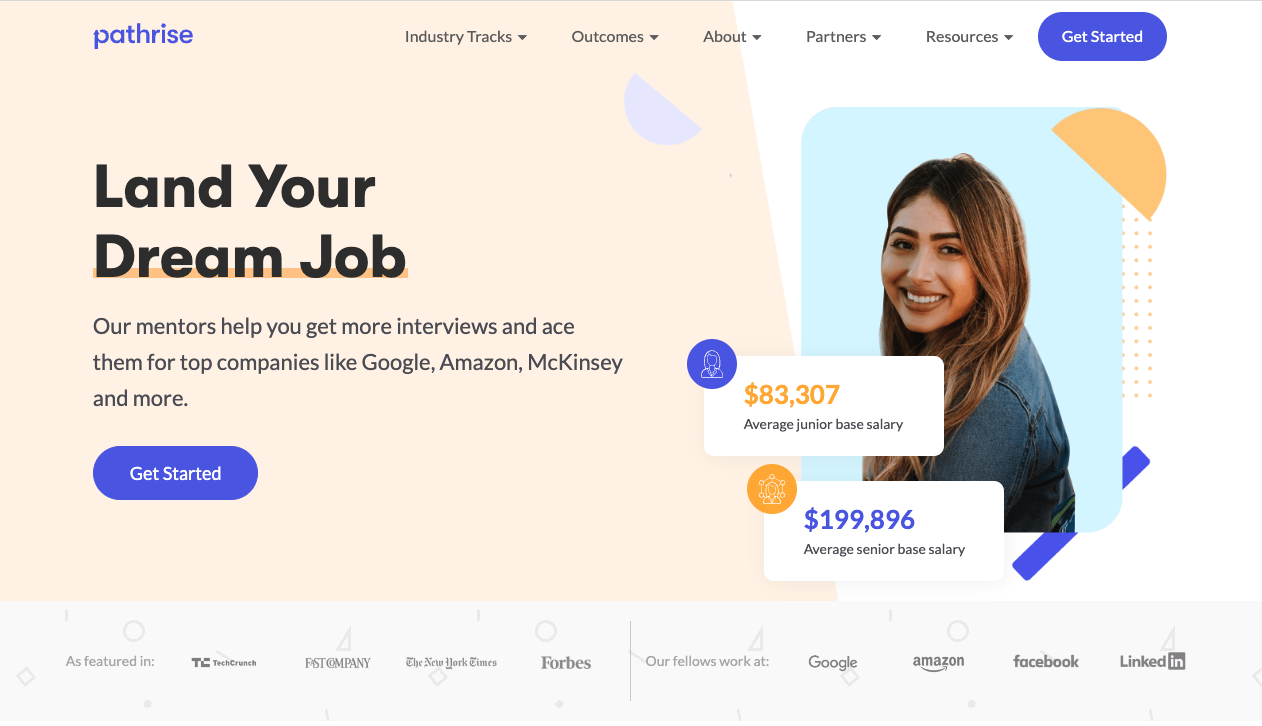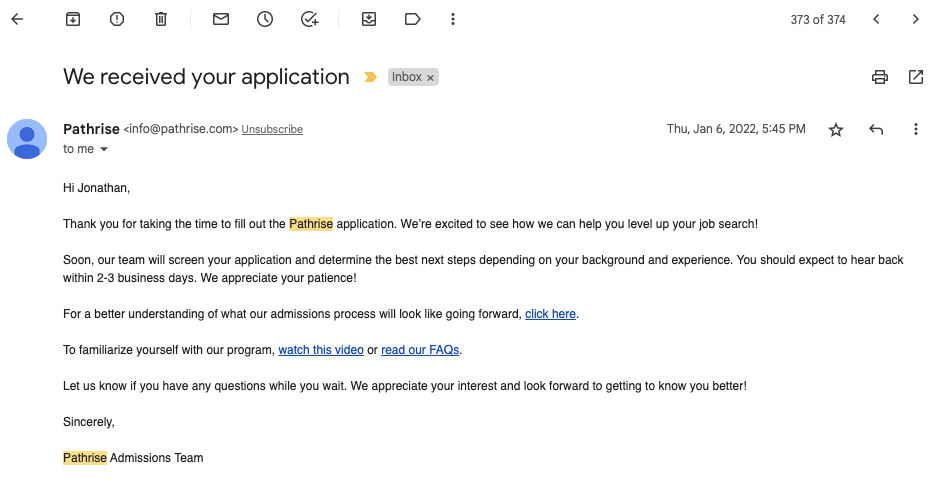Pathrise
Housekeeping
Hey there! Welcome back to another thought article. A couple things to note before I dive into this topic. I realize I really didn’t give much context as to what I would likely be posting about moving forward in the previous article, and left much up to interpretation. Well, if you’re following along you can expect me to talk about a few things-
- Software Engineering/Data Science/Biology
- This is expected. I work as a Data Scientist, enjoy building software, and much of my formal training is in the life sciences. So those make sense.
- Books
- I read a lot. Definitely not as much as I once did, but I have nice book collection and try and read a bit every morning. I’ll probably drop the occasional book review which could be fiction, non-fiction, or a textbook. Currently I’m reading more technical books on engineering.
- Product reviews
- I take months to pull the trigger on relevant purchases (like a new desk chair, gadget, gizmo) and don’t really trust Amazon reviews. So I’ll probably pay it forward and make some posts reviewing some of the purchases I’ve made.
Those will be the bulk of what I write about, but honestly I have a wide range of interests. So it’s likely I’ll have the occasional “off brand” (although this site is literally titled my name) post. So stay tuned.
NOTE: I also should probably mention that this post was not sponsored by Pathrise in any way. I was a Pathrise mentee for 6 months and am just sharing my experience. However, if you’re from Pathrise feel free to support at the link below 👍🏽
What lead me to Pathrise

Like I mentioned previously, I had a bit of an unconventional journey to the software/data field. My undergraduate degree is in Biological Sciences, where I took technical classes such as calculus, statistics, physics, etc, but not as many as a computer science major. My Master’s degree in Human Physiology wasn’t much help marketing-wise either. When you’re applying to an entry level position that could get hundreds of similar looking resumes, having a life sciences degree is a good way to initially get filtered out.
NOTE: As much as I enjoy biology, it’s the ugly step child of the STEM field and doesn’t get as much appreciation as the TEM part of the acronym. Of course a bunch of caveats in that statement, but I think it’s mostly true.
That being said, I needed a little help. If I was going to land a job after graduation in time to pay the bills and make ends meet, I was going to need all the help I could get. That includes resume building, preparation for technical interviews and tips on efficiently networking and applying. I had a couple different bootcamps on my radar. Specifically, Springboard a bootcamp my brother did, General Assembly, correlation one, and finally Pathrise. Springboard seemed solid, my brother had done it and he was a data analyst at a big retail company. General Assembly seemed like it was a quality program that would teach me great fundamentals, but it was also a huge financial investment. Ultimately what it came down to was a few things:
- I was a good self-learner and was at the stage where I knew where my technical deficiencies were and could leverage resources to fill those gaps.
- I had no money, so I would need to defer payment to future income.
- I really needed guidance and course correction on what to focus on learning.
This specific combination of needs (along with the fact I was rejected from correlation one) led me to choosing Pathrise as my bootcamp of choice.
Getting into Pathrise
Pathrise offers many different paths or “industry tracks” that you can apply for. Some examples are Software engineering, marketing, and data (encompassing data science, data analytics, etc). I submitted my application to Pathrise Data track on January 6, 2022, and on January 10, 2022 I recieved a “Data Diagnostic Test”.

To be completely honest this was over a year ago and I am not 1000% sure what was on the test. What I do remember was that because I applied for the data track, the test had questions about fields relating to data science/data analytics, such as some statistics questions, light programming questions, and some mathematics. All of it was multiple choice, and I had 30 minutes to complete it. What I do remember was that the concepts were fairly introductory (i.e. what kind of model would you use to predict a continuous variable, logistic regression or linear regression).
These questions were meant to see if you had some level of understanding already in the field you wanted to go into. This is because Pathrise is less about teaching you the technical skills from nothing and moreso honing the skills you already have and helping you optimize your application strategy to land a role.
On January 28th, 2022, I got an interview for Pathrise with one of the Pathrise Technical mentors. Pathrise has a host of Technical and Career “Mentors” that guide you and help you on a weekly basis, a little more about that later. During this interview I had to walk the interviewer through my background, and describe a technical project that I had on my resume. I talked through a (very simple) linear regression model I had build based on heart rate data from my WHOOP fitness band. The point wasn’t to get grilled, but more so to make sure that you are not 100% completely green, because again, they don’t teach you the skills from nothing but rather help you get better at what you already know. With that being said, if you can intimately describe the mathematics behind a recurrent neural network, you’re probably a bit overqualified.
After that, I had a couple calls with an admissions manager, and ultimately started as a Pathrise mentee on March 14th, 2022.
What Pathrise is like
Like I mentioned earlier Pathrise teaches you the fundamentals of programming and statistics helps you:
- Hone the skills you have
- Draft a great resume
- Optimize your application strategy
- Learn from industry professionals
- Practice technical and behavioral interviews
They accomplish these items through live workshops that are hosted by either an industry or career mentor. An industry mentor is an individual who currently works in a technical role, and whos primary focus is to host workshops geared toward practicing technical skills. For example, I often attended the SQL workshop on Thursday nights because SQL was something I “knew” (Select * from TABLE) but needed to get a lot better at if I was going to pass a technical interview.
Career mentors were individuals who may have worked or currently work in a related field (in this case data) but whose primary responsibility is to help you optimize your application strategy, craft a better resume, and optimize your application strategy.
They provide you with a portal to access these mentors as well as provide subscriptions to technical training resources such as Udemy and LeetCode. You also have weekly meetings with your career mentor who gives you tasks (apply to x many jobs, make x changes to you resume, schedule a technical interview with x industry mentor) and is their to support you and hold you accountable.
NOTE: Your career mentor is huge. Not just to guide you and hold you accountable, but also to keep you level-headed and sane. Job hunting is hard and stressful these days. Having somebody in the thick of it with you is huge.
Finally, the name of the game is preparing, going to workshops, applying, and landing a job.
Paying for Pathrise
Pathrise has a couple ways you can pay for their services.
Upfront
- You can pay an upfront lump sum before you begin. I didn’t do this, but I believe its between 7-10k. If you don’t land a job in 12 months you are provided a full refund (provided you are actively applying the duration of those 12 months).
Income Share Agreement
- If you go on any reddit post about Pathrise you will see this harped on. The income share agreement is a contract saying that you will pay a certain percentage of your salary after your get a job to pay for the services Pathrise provided to you. I cannot remember if this percentage is based off of your total compensation or base salary before taxes. This is something important to consider before signing the ISA. The ISA states that you will have to pay this percentage either for 24 months, or until you pay 12k total, whichever comes first. The percentage that you would have to pay ranges between 5-18% if I’m not mistaken, and if you don’t land a job in 12 months you don’t have to pay anything (again, provided you were actively applying during those 12 months). Personally, I have no issues with this practice and this is what I initally was going to do. If you are thinking about taking this route it is crucial you are very discerning about what job you accept, and you need to maximize Pathrise's resources and your earning potential coming out of this program so that the ISA is not a huge burden. You should probably do this regardless of which option you choose, but it’s critically important if you’re going to do the ISA. It’s also important to note that Pathrise does not make you accept any offer you are not comfortble with, so work with your career mentor to ensure a great fit.
Finally, you can pay a lump sum at the end.
- This is what I did. I was going to do the ISA, but after I landed my offer I realized I was going to be remote in a LCOL area and really didn’t need a $16k Subaru to go to Costco on the weekends. So I sold it and used $10k to pay off the hitmen at Pathrise (kidding).
Conclusion
A long story long, I would recommend the Pathrise data track under the following circumstances:
You have a solid base in whatever field you're wanting to go into.
- By solid base I mean you understand the fundamentals of statistics, can talk about machine learning models and maybe have implemented a few vanilla models in a Jupyter notebook before.
Point number 1 and you have the funds to pay for Pathrise upfront.</mark?>
- If you have the cash to pay for the services up front and feel like Pathrise can benefit you based on my outline, by all means go for it.
You're a good self-motivated learner.
- Like I mentioned, Pathrise does not have a formal learning curriculum. The industry mentors can tell you where you may be lacking and point you to resources get up to speed, but you’re going to need to carve out time to learn these skills yourself. If that doesn’t sound like a good time then Pathrise probably isn’t for you.
DISCLAIMER:A quick disclaimer, I was in Pathrise from March 2022 - September 2023, so things may be different now. They might have changed things up, and changed some pricing percentages. I reserve the right to be a little off on those numbers.
If you feel like this helped you out, feel free click the link below and support this post. If you’re thinking about joining Pathrise, I have a link that gives me a kick back if you sign up. I realize that putting the link in here might take away some credibility, and I get that. But ultimately my girlfriend and I’s cat Vader needs treats and I got bills to pay so if you feel like you’re going to join and want to help out shoot me a message to jon.dickinson17@gmail.com and I will gladly provide that link.
